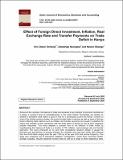| dc.contributor.author | Eric Oduor Ochieng, Destaings Nyongesa, Nelson Obange | |
| dc.date.accessioned | 2020-12-01T08:38:40Z | |
| dc.date.available | 2020-12-01T08:38:40Z | |
| dc.date.issued | 2020 | |
| dc.identifier.uri | https://repository.maseno.ac.ke/handle/123456789/3149 | |
| dc.description.abstract | Across all the countries, the balance of trade has remained a key indicator of economic activities as
it shows a country’s level of competitiveness in the world market. Economists are divided on
whether a persistent trade deficit is good or bad for a developing country like Kenya. Contrary to
most of the similar previous studies, this study included trade in services as well as some of the key
factors affecting trade balance such as inflation and transfer payments and sought to establish the
nature and strength of their connection with the trade deficit in Kenya as well as their respective
impulse responses. This study adapted a reduced form of the balance of trade model by
hypothesizing that balance of trade is a function of FDI, inflation, real exchange rate and transfer
payments. The study embraced an ex post facto correlational research design to gauge the
elements and earnestness of synergy between the variables and used time series data obtained
from the World Bank ranging from the year 1978 up to the year 2014 with annual frequency. This
study also employed use of descriptive statistics, Cointegration, Vector Error Correction Model,
Granger causality, impulse response function tests as well as a range of other diagnostics tests.
This study concluded that in the long-run, only inflation and transfer payments have positive and
negative significant effects respectively on both trade deficit and also foreign direct investments
through there is no respective causality. This study also established that trade deficit has positive
significant short-run effects on transfer payments while real exchange rate has positive significant
short-run effects on inflation though there is also no respective causality. This study found that any
shocks need to be addressed within the shortest possible timeframe as the impulse response
functions indicate the effects being adverse within the first few years as effects only begin to die out
from the fourth year. The study therefore concluded that trade deficit is not really bad for Kenya as
measures that should reduce it actually reduces foreign direct investments which are really
important for a growing economy like Kenya. | en_US |
| dc.publisher | Asian Journal of Economics, Business and Accounting | en_US |
| dc.subject | Trade deficit; FDI; real exchange rate; inflation; transfer payments; VECM. | en_US |
| dc.title | Effect of Foreign Direct Investment, Inflation, Real Exchange Rate and Transfer Payments on Trade Deficit in Kenya | en_US |
| dc.type | Article | en_US |

